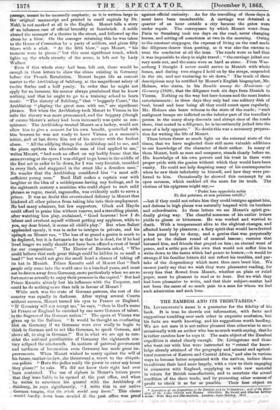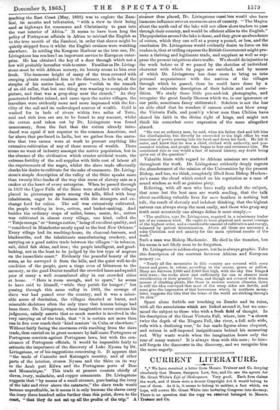THE ZAMBESI AND ITS TRIBUTARIES.*
German tongue,, that the whole world may know." This clause • Narratire of an .xpecution to the Z,ambesi and its Tributaries and of the Disco- e, • ry of the Lakes Shanra and Nyasea. l8Sd-1861. By David sad Charles Living - Da. LIVINGSTONE'S name is a guarantee for the fidelity of his book. rt is true he shovels out information, with facts and suggestions tumbling over each other in exquisite confusion, but his facts are worth knowing, and his suggestions worth heeding. We are not sure it is not rather pleasant than otherwise to meet occasionally with an author who has so much worth saying, that he is rather careless how he says it. The main object of the Zambesi expedition is stated clearly enough. Dr. Livingstone and those who 'went out with him were instructed to "extend the know- ledge already attained of the geography and mineral and agricul- tural resources of Eastent and Central Africa," and also in various ways to become better acquainted with the natives, induce them to cultivate their land more largely, with a view to their engaging in' commerce with England, supplying us with raw material in return for British manufactures, and to ascertain the actual condition of the slave trade, and by promoting other sources of profit to check it as far as- possible. Their first object on reaching the East Coast (May, 1858) was to explore the Zam- besi, its mouths and tributaries, "with a view to their being used as highways for commerce and Christianity to pass into the vast interior of Africa." It seems to have been long the policy of Portuguese officials in Africa to mislead the English as to the true mouth of the Zambesi, in order that slaves might be quietly shipped from it whilst the English cruisers were watching elsewhere. In settling the Kongone Harbour as the true one, Dr. Livingstone has rendered an important service to European enter- prise. He has obtained the key of a door through which not a few will probably hereafter wish to enter. Familiar as Dr. Living- stone must be with African scenery, its beauty seems to him ever fresh. The immense height of many of the trees covered with creeping plants reminded him in the distance, he tells us, of the steeples of his native land, and gave "relish to the remark of an old sailor, that but one thing was wanting to complete the picture, and that was a grog-shop near the church." As they penetrated further inland, and came upon the native villages, the travellers were evidently more and more impressed with the fer- tility of the soil and its undeveloped sources of wealth. Gold is washed for in beds of rivers within two miles of Tette, coal and rich iron ore are to be found to any amount, whilst the cotton seed taken out by Dr. Livingstone was found unnecessary, from the fact that the cotton already intro- duced was equal if not superior to the common American, and far above that produced in India, but we gather from the narra- tive that two causes were at work to prevent anything like extensive cultivation of any of these sources of wealth. There seems no want of industry amongst the native population, but in the absence of the civilization which creates artificial wants, the extreme fertility of the soil supplies with little cost of labour all the requirements of the negro, whilst the slave trade effectually checks his desire to cultivate for the sake of commerce. Dr. Living- stone's simple description of the valley of the Shire speaks more than twenty blue-books of the way this curse of slavery eats as a canker at the heart of every enterprise. When he passed through in 1859 the Upper Falls of the Shire were studded with villages placed in picturesque spots among the hills, filled with busy inhabitants, eager to do business with the strangers and ex- change food for calico. The soil was extensively cultivated, the people working in iron, cotton, and basket-making. And besides the ordinary crops of millet, beans, maize, &c., cotton was cultivated in almost every village, one kind, called the " Tonje mange," or "foreign cotton," being of excellent quality, and "considered in Manchester nearly equal to the best New Orleans." Every village had its smelting-house, its charcoal-burners, and blacksmiths, and the inhabitants manufacturing crockery, and carrying on a good native trade between the villages "in tobacco, salt, dried fish skins, and iron ; the people intelligent, and good- looking, not in the least to be judged by the low type of negroes on the immediate coast." Evidently the peaceful beauty of the scene, as he surveyed it from the hills, and the quiet well-to-do condition of the people, gave a tinge even of bitterness to the memory, as the good Doctor recalled the crowded lanes and squalid poor of many a well remembered alley in our crowded cities at home. "Here is room enough, and to spare," he seems to have said to himself, "while they perish for hunger ;" but passing through this same valley in 1863, the scourge of slave war had passed over the country, and it was a miser- able scene of desolation, the villages deserted or burnt, and miserable skeletons often the only trace that human beings had been there. Dr. Livingstone, whose imagination never outruns his judgment,. calmly asserts that so much murder is involved in the very carrying on of the trade, that "it is certain not more than one in five ever reach their kind masters' in Cuba or elsewhere." Without fairly facing the enormous evils resulting from the slave trade, thus carried on in great measure by half-caste Portuguese or Portuguese convicts against Portuguese laws, but with the con- nivance of Portuguese officials, it would be impossible fairly to estimate the importance of the discovery of Lake Nyassa by Dr. Livingstone, or of his suggestions concerning it. It appears that "the trade of Cazembe and Katanga's country, and of other parts of the interior, crosses Nyaasa and the Shire on its way to the Arab port Kilwa and the Portuguese ports of Iboe and Mozambique." This trade at present consists chiefly of slaves, ivory, malachite, and copper ornaments. Dr. Livingstone suggests that "by means of a small steamer, purchasing the ivory of the lake and river above the cataracts," the slave trade would become unprofitable, 'as it seems it is only because the slaves carry the ivory three hundred miles further than this point, down to the coast, "that they do not eat up all the profits of the trip." A steamer thus placed, Dr. Livingstone consilera would also have immense influence over an enormous area of country. "The Ai agitu about the north end of the lake will not allow slave traders to paws through their country, and would be efficient allies to the English." The population around the lake is dense, and they grow an abundance of cotton, which they can sell at a penny a pound, or less, and the conclusion Dr. Livingstone would evidently desire to force on his readers is, that at trifling expense the British Government might pro- mote a thriving and legitimate trade, and supplant as well as sup- press the present iniquitous slave traffic. We should do injustice to the work before us if we passed by the sketches of individual character with which its pages are enriched, and by means of which Dr. Livingstone has done more to bring us into personal acquaintance with the natives of the villages through which he passed, than he could have done by a far more elaborate description of their habits and social con- dition. We study these little pen-and-ink photographs, and recognize the great family likeness which we, in our ignorance or our pride, sometimes fancy obliterated. Sekeletu is not the less an able chief that he wonders if cannon could not blow away the Victoria Falls, and possiMy u hiter men than Chibisa have shared his faith in the divine right of kings, and might not think his somewhat naive expression of the same altogether absurd.
"He was an ordinary man, he said, when his father died and left hint the chieftainship, but directly he succeeded to the high office he was conscious of power passing into his head and down his back. He felt it enter, and knew that he was a chief, clothed with authority, and pos- sessed of wisdom, and people then began to fear and reverence him. He mentioned this as one would a fact of natural history, any doubt being quite out of the question."
Valuable hints with regard to African missions are scattered throughout the work. Dr. Livingstone evidently deeply regrets the abandonment of the mission of the Universities by the present Bishop, and has, we think, completely lifted from Bishop Macken- zie's name the cloud which rested on his reputation as a man of sound wisdom as well as genuine piety.
Believing, with all men who have really studied the subject, that none but the best men are worth sending, that the talk about sacrificing valuable lives for mere heathen is nothing but talk, the result of slovenly and indolent thinking, that the highest natures can always stoop the most easily, and those who grasp any truth most accurately can always define it most simply,— " The qualities, says Dr. Livingstone, required in a missionary leader are of no common kind. He ought to have physical and moral courage of the highest order, and a considerable amount of cultivation and energy, balanced by patient determination. Above all these are necessary a calm Christian zeal and anxiety for the main spiritual results of the work."
Such a man was Bishop Mackenzie. He died in the trenches, but.
his name is not likely soon to be forgotten.
Dr. Livingstone is seldom eloquent, but he is always graphic. Take this description of the contrast between African and European scenery :—
" Nearly all the mountains in this country are covered with open forest and grass, in colour, according to the season green or yellow. Many are between 2,000 and 3,000 feet high, with the sky line fringed, with trees ; the rocks show just sufficiently for one to observe their stratification or their granitic form, and though not covered with dense masses of climbing plants, like those in moister eastern climates, there is still the idea conveyed that most of the steep sides are fertile, and none give the impression of that barrenness which, in northern moun- tains, suggests the idea that the bones of the world are sticking througla its skin."
Space alone forbids our touching on Zumbo and its ruins,, with all the associations which are linked around it, but we com- mend the subject to those who wish a fresh field of thought. In his description of the Great Victoria Fall, where, into "a chasm twice the depth of the Niagara Fall, the river, a full mile wide, rolls with a deafening roar," he has made figures alone eloquent, and retires in self-imposed insignificance behind his measuring rod. Why waste words when the imagination hears only the roar of many waters? It is always thus with this man ; he him- self forgets the discoverer in the discovery, and we recognize him the more eagerly.



































 Previous page
Previous page